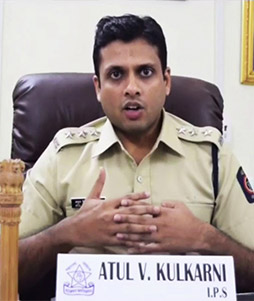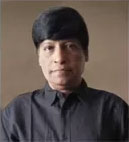
No matter how you feel about law enforcement as a whole, police work is a dangerous, challenging, and often a thankless job. Every day they are thrust into difficult situations and expected to make decisions in quick time. They are never “off duty” and are sworn to protect people’s safety and peace, but there are exceptional officers like Atul Vikas Kulkarni, Additional Superintendent of Police, Gondia (Anti-Naxal Operations) whose call of duty goes far beyond the accepted brief of the Men in Uniform.
The Belagavi-born IPS officer of the 2015 batch completed a Bachelor’s in Computer Science and Master’s in Urban Policy and Governance from the TISS, has been associated with several welfare organizations — a clear indication that behind his tough exterior lurks a sensitive human being. That, if any, explains the string of initiatives he took in community policing and stitched a success story out of it. Before taking charge of the present incumbency, he was also instrumental in measures relating to women’s safety.
Of course, the road to success was fraught with several difficulties. From the rural roots of Kannada Karnataka to the cosmopolitan Maharashtra, adapting to English was one of them but he was never short on inspiration and motivation. The biggest was in-house from his mother. Over a period of time, they became a Mutual Admiration Club. It also played a pivotal role in his inclination towards the Indian Police Service. The turning point, however, came in 2008 when a personal tragedy brought about a change in his outlook. It occurred to him that he could serve the cause of the nation and disadvantaged sections.
The degree in engineering did pitch-form him into a software company but one year into it, he found the work mundane and his heart wasn’t into it. His restive mind yearned to do something challenging and where he could leave his stamp. A colleague who had won recognition despite suffering from Cerebral Palsy disabilities was an eye-opener. “If he can, why can’t I?” The stint also brought him in close contact with several environmental NGOs in Bengaluru where he pitched in as volunteer of his own volition.
At this juncture, Mr Kulkarni found himself at the crossroads. He faced the dilemma whether he should continue with his basic expertise in Software and find a lucrative job in US or even do MBA or higher studies. He decided to heed to the call of his conscience and did neither, In 2010, he took up the Urban Planning course in the TISS. “The journey in TISS was wonderful where I got the best of classroom and on-field experience. I saw the ground realities on my visit to slums, the Homeless, Water, Sanitation and allied issues. It strengthened my resolve to get into where my proclivities lay”. Being a social science student, he earnestly believed that creative and good initiatives could alter the lives of the weaker sections better.
Noting his journey and foray into IPS, he recalls how he could not get through the prelims but in the second attempt he glided – by his own admission — through the 4C formula of Clarity, Character, Consistency and Confidence. True to his benevolent nature, he has written a book that helps UPSC aspirants to crack the exam in the post-Independence era with regular updation. The book is sought-after and is available on Amazon. His record shows that he has applied his educational, social and official discipline to his work, which is demanding 24×7. His other two books relate to Philosophy and lakes in Bengaluru.
The IPS officer feels there is a palpable fear in the minds of people about the police. To remove any misgivings, he keeps meeting people as confidence building measure. Finding that women are perhaps the most oppressed sections, he set up a “Women/Bharosa Cell” to deal with grievances of women and juveniles apart from petty complaints, such as squabbles over parking or children’s play areas, family disputes and other issues related to women. The Cell sees an active counseling team that includes advocates, doctors, social workers and women police officers/senior police inspectors. It is a measure of the success of this initiative that an overwhelming 80% cases have been resolved. The main motto of the Cell is to reduce the gap between the police and public, to hear people out who are not able to approach the court for some reason and reduce the judiciary’s burden. The ‘Police Kaka’ (police uncle) is another such initiative. Personnel from the level of a Constable to the Senior Police Inspector and even the Deputy SP are assigned as ‘Police Kaka’ for one educational institution in their respective jurisdiction. Similarly, one female personnel is shortlisted to handle the task of ‘Police Didi’ for each of the schools and colleges to establish a friendly rapport with the girls.
Mr Kulkarni revels in serving people despite the challenges that he faces daily as a law-enforcing authority. “Mira-Bhayender was a tough and dangerous terrain with a dubious record in crime and you need to be constantly on guard,” says he but people look up to him given his humane approach to policing. His present posting in the Anti-Naxal Operations is even more challenging. On a personal front, he has his own ways of marginalizing the stress that accrues from his job. All the challenges are braved with Yoga and Meditation that he has been practicing religiously for 15 years. It is easy to take the stress in stride once you know that it is an integral part of the job. Reading books, scriptures and increasing knowledge are his antidotes to ward off the pulls and pressures.
Once a police officer, always a police officer but Mr Kulkarni takes time out from his demanding work constraints and loves to travel – so what is nearby places – explore wildlife and indulge in what he modestly calls as amateur photography. “Visiting new places is a veritable tonic that boosts my energy and enthusiasm. The love for Nature goes well with my spirit for adventure,” he says. His experiences are methodically penned down in the blogs he posts on his website.
Here is the link to obtain your copy:
A Diwali with tribal brothers https://youtu.be/AsRnqO2NzLI

A Column By
Raju Korti – Editor
The Resource 24X7
A Journalist With 4 Decades of Experience With Leading Media Houses.
